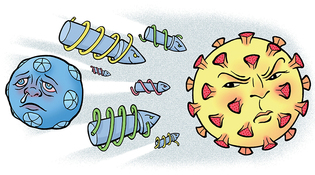 loading
loading
FindingsNoted Gregory NemecView full imageThe rhinovirus that causes the common cold might help protect against COVID-19. When our cells are exposed to rhinoviruses, they produce a natural antiviral —interferon—to stop the viruses from replicating. Interferon is also effective against COVID. Assistant professor Ellen Foxman ’93 and her team found that prior exposure to the common cold can block replication of the COVID virus. But timing is key. Triggering the defenses early may prevent COVID, but later treatment may not work. Interferon is most effective soon after infection—when many people show no symptoms of COVID. Fruit flies have shown Yale professor Michael Nitabach and his team how neurochemistry may influence food choices. The insects are attracted to sweet, nutritious calories; they avoid bitter food, which might be toxic. By offering nutritious food laced with a bitter substance and a sweet but less nutritious option, researchers found that the hungrier the flies were, the more they tolerated bitterness to get more calories. But when the team reduced some of the flies’ neural activities, even ravenous flies would “decide” to eat lower-calorie food. The reward systems in fruit fly and human brains are similar, so this study may illuminate eating behavior in people.
The comment period has expired.
|
|